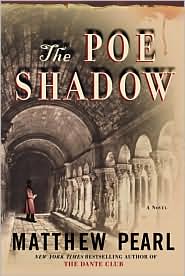Literary Lunacy
The Poe Shadow, by Matthew Pearl. Very disappointing. Pearl's first novel, The Dante Club, was excellent - a mystery based in historical Boston. Well-written with a compelling, chilling plotline. I was very much looking forward to Pearl's sophomore effort, which makes the lackluster Shadow all the more disappointing. If one's sole desire upon picking up a book is to finish it so as to start something more enjoyable or interesting, that does not speak very highly of the novel. Unfortunately, The Poe Shadow was just such a one of these books for me. (Of which I have encountered too many as of late. I must vet my reading list more carefully.)
The Poe Shadow takes place in Baltimore, Maryland, in 1841. The protagonist is a lawyer who just happens to pass by the poorly-attended funeral of Edgar Allan Poe, of whom he is a fan. "Fan" actually doesn't do Quentin Clark's enthusiasm for Poe's work justice, as he is obsessed well beyond the brink of sanity. After Poe's death, the media was not kind, speaking of his penury, his alcoholism, his dying alone (a mere four people attended his funeral), and generally not exalting Poe's literary gift to the world in the manner in which Clark feels that Poe deserves. Clark sets out to clear Poe's sullied reputation and uncover the mystery surrounding his death. Knowing that he cannot do this on his own, Clark solicits help from the very pages of Poe's work - C. Auguste Dupin, the star of Poe's detective stories, including "The Murders in the Rue Morgue" and "The Purloined Letter." Dupin was evidently based on someone whom Poe knew in real life, so Clark crosses the Atlantic to Paris to locate the "real" Dupin, and meets several characters who claim to be the inspiration for Dupin for their own motives.
The frustrating thing about the novel is that the mystery at its core isn't a compelling one. True, there were some murky details surrounding Poe's death, but nothing particularly interesting or relevant (such as the question of foul play). The novel is simply a madman's attempt to reconcile reality with his idealized version of Poe - or at least comes off like that.
It's an interesting novel as a period piece, and it does get a bit better toward the end, when Clark becomes exposed to genuine danger. It's also interesting that the novel contains previously unpublished theories about Poe's death based on Pearl's own research. This use of historical research to bring new information to light in the form of a novel is impressive, but unfortunately it can't save it. On the whole it's a frustrating, disappointing experience. Keep your Pearl reading to The Dante Club.



1 comments:
Matthew Pearl, you mean. Daniel Pearl was the journalist murdered in Pakistan a few years back. (http://en.wikipedia.org/wiki/Daniel_Pearl)
Post a Comment